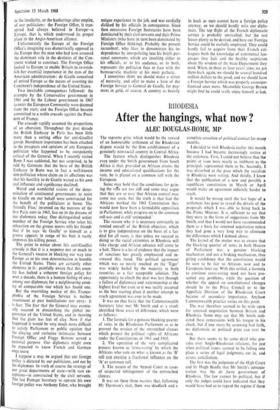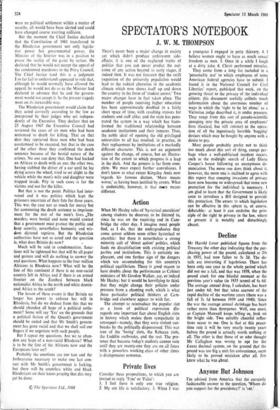After the hangings, what now ?
RHODESIA ALEC DOUGLAS-HOME, MP
The supreme prize which would be the reward of an honourable settlement of the Rhodesian dispute would be the firm establishment of a genuinely non-racial country in Central Africa.
The feature which distinguishes Rhodesia even under the Smith government from South Africa is that, provided an African attains the income and educational qualifications for the vote, he is placed on a common roll with the European.
Some may hold that the conditions for gain- ing the vcfle are too stiff and some may argue that they are so easy that African control may come too soon, but the truth is that had the Africans worked the 1961 Constitution they would now have been a formidable opposition in Parliament, while progress on to the common roll was and is still 'unimpeded.'
The reason why it is necessary constantly to remind oneself of the British objective, which is to give independence on the basis of a fair deal for all races, is that unless we succeed in doing so the racial extremists in Rhodesia will take charge and African advance will come to a halt. There is a lot of evidence that the impact of sanctions has greatly emphasised and in- creased this trend. The political agreement which was so nearly reached on the 'Tiger' was widely hailed by the majority in both countries as a fair acceptable solution. The opportunity to clinch the deal was lost through a failure of diplomacy and statesmanship at the highest level but even so it was tacitly accepted as the best starting place if another attempt to reach agreement was ever to be made.
It was on that basis that the Commonwealth Secretary later met Mr Smith and as a result identified three areas of difference, which were as follows:
1. The formula for a genuine blocking quarter of votes in the Rhodesian Parliament so as to prevent the erosion of the entrenched clauses which protect the political rights of Africans under the Constitutions of 1961 and 1965.
2. The operation of the very complicated process known as 'cross-voting' by which the Africans who vote on what is known as the 'B' roll can exercise a fractional influence on the 'A' or common roll.
3. The nature of the Appeal Court in cases of suspected infringement of the entrenched clauses.
It was on these three matters that, following Mr Thomson's visit, there was deadlock and a complete cessation of political contact for many months.
I decided to visit Rhodesia earlier this month because I had become increasingly restive at the stalemate. First, I could not believe that the points at issue were nearly as stubborn as the principals represented them to be. Secondly, I was disturbed at the pace which the racialists in Rhodesia were setting. And thirdly, I knew that the publication of a new and possibly a republican constitution in March or April would make an agreement infinitely harder to reach.
It would be wrong until the last hope of a settlement has gone to reveal the details of the proposals which I was able to bring back to the Prime Minister. It is sufficient to say that they were in the form of suggestions from Mr Smith, and that 1 would not have recommended them as a basis for renewed negotiation unless they had gone a very long way to eliminate the differences which I defined above.
The kernel of the matter was to ensure that the blocking quarter of votes in both Houses of Parliament was a genuine blocking mechanism and not a braking mechanism, thus giving confidence that the constitution would be seen to be fair to Africans now and to Europeans later on. With this settled, a formula to continue cross-voting need not have pre- sented any problems, while the question of whether the appeal on constitutional changes should be to the Privy Council or to the Appellate Division of the Rhodesian Court became of secondary importance. Anyhow Commonwealth practice varies on this point.
The way therefore seemed to be wide open for renewed negotiation between Britain and Rhodesia. Some may say that Mr Smith indi- cated these concessions with his tongue in his cheek, but if one starts by assuming bad faith, no diplomatic or political prize can ever be won.
But there seems to be some devil who pre- sides over Anglo-Rhodesian relations, for just when political issues seemed to be falling into place a series of legal judgments cut in, and across, conciliation.
The first was the judgment of the High Court and Sir Hugh Beadle that Mr Smith's adminis- tration was the de facto government of Rhodesia. The law cannot be political, but if only the judges could have indicated that they would have had so to regard the regime if there
were no political settlement within a matter of months, all would have been alerted and could have changed course averting collision.
But the moment the Chief Justice declared that the Constitution of 1961 transferred to the Rhodesian government not only legisla- tive power but governmental power, the Minister of the Interior was in a position to prove the reality of the point by action. He declared that he would not accept the appeal of the condemned murderers to the Privy Council. The Chief Justice (and this is a judgment I so far fail to understand) appeared to rule that, although he would normally have allowed the appeal, he would not do so as the Minister had declared in advance that he and the govern- ment would not accept it. So the present tragedy ,went on its inexorable way.
The Rhodesian government would claim that they acted correctly according to the law as
interpreted by their, judges who act indepen-
dently of the Executive. They declare that on 25 August 1967 the Executive Council had reviewed the cases of six men who had been sentenced to death for killing. That on that date they reprieved three men who bad been condemned to be executed, but that in the case of the other three they confirmed the death sentence because of the bestial nature of the crimes. No one can deny that. One had hacked an African to death with an axe; the other two, having stabbed the driver of a car until he lay dying across the wheel, tried to set alight to the vehicle while the man's wife and daughter were trapped inside. Pity in such cases is for the victims and not for the killer.
But that is not the point. Politics had inter- vened and it was politics which kept the prisoners uncertain of their fate for three years.
This was the case not so much for mercy but for commuting the death sentence to imprison- ment for the rest of the men's lives. .,The murders were bestial and none would contest that a government must protect the public and keep security, nevertheless humanity and wis- dom dictated reprieve. But the Rhodesian authorities have not so acted and the question is, what does Britain do now?
Much will be said in condemnation. Sanc- tions will be tightened but that will be all paper and gesture and will do nothing to answer the real questions. What happens to the four million Africans in Rhodesia now? What will be the fate of this continent if there is no non-racial country left in Africa and if there is an armed frontier on the Zambesi between black nationalist Africa to the north and white domin- ated Africa to the south?
The lesson of these events is that Britain no longer has power to enforce her will in Rhodesia, but do we deduce from this that we should abandon all hope of a political settle- ment? Some will say 'Yes' on the grounds that
a political fiction of the Queen's government should be ended and that Mr Smith's govern- ment has gone racial and that we shall soil our fingers if we negotiate with such people.
But I repeat my questions. Are we to aban- don any hope of a non-racial Rhodesia? What is to be the fate of the Africans now and the Europeans later on?
Probably the emotions are too taut and the forbearance necessary to make one last con- tact with Mr Smith's government is lacking, but there will be countless white and black Rhodesians on their knees praying that this may yet be done.
© The Spectator Ltd., 1968











































 Previous page
Previous page